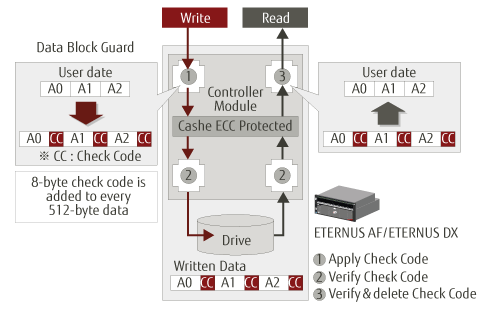Data block check codes for improved data integrity - Data Block Guard
When data is written from the server, the Data Block Guard function adds eight bytes check codes to each block (every 512 bytes) of the data and verifies the data at multiple checkpoints to ensure data consistency. This function can detect a data error when data is destroyed or data corruption occurs. When data is read from the server, the check codes are confirmed and then removed, ensuring that data consistency is verified in the whole storage system.

In addition, the T10-DIF function is supported. T10-DIF is a function that adds a check code to data that is to be transferred between the Oracle Linux server and ETERNUS AF and ETERNUS DX (S3 or later[1]) ensures data integrity at the SCSI level.
The server generates a check code for the user data in the host bus adapter (HBA), and verifies the check code when reading data in order to ensure data integrity.
The ETERNUS AF and ETERNUS DX (S3 or later[1]) double-check data by using the data block guard function and by using the supported T10-DIF to improve reliability.
Data is protected at the SCSI level on the path to the server. Therefore, data integrity can be ensured even if data is corrupted during a check code reassignment.
By linking the Data Integrity Extensions (DIX) function of Oracle DB, data integrity can be ensured in the entire system including the server
- [1]Except ETERNUS DX60 S5/S4/S3.
Benefit
- Very high data integrity and improved system reliability
Product Requirements
Supported Storages All-Flash Arrays ETERNUS AF150 S3
ETERNUS AF250 S3/S2, AF250
ETERNUS AF650 S3/S2, AF650
ETERNUS DX200FHybrid Storage Systems ETERNUS DX60 S5/S4/S3
ETERNUS DX100 S5/S4/S3, DX200 S5/S4/S3
ETERNUS DX500 S5/S4/S3, DX600 S5/S4/S3
ETERNUS DX900 S5
ETERNUS DX8700 S3/S2, DX8900 S4/S3
ETERNUS DX60 S2, DX80 S2, DX90 S2
ETERNUS DX400 S2 series- *Note:Products/features/support content introduced on this page may be modified without notice.
Related Contents



